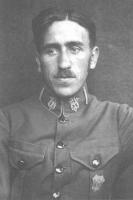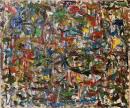Їхав козак на війноньку
Mykhailo Orest Haivoronsky / Михайло Орест ГайворонськийLanguage: Ukrainian

Їхав козак на війноньку: [1]
"Прощай,- сказав,- дівчинонько,
Прощай, миленька, чорнобривенька,
Я йду в чужую сторононьку!
Прощай, миленька, чорнобривенька,
Я йду в чужую сторононьку!
Дай же, дівчино, хустину,
Може, я в бою загину,
Темної ночі покриють очі,
Легше в могилі спочину!"
Темної ночі покриють очі,
Легше в могилі спочину
Дала дівчина хустину,
Козак у бою загинув,
Темної ночі покрили очі,
Вже він в могилі спочинув.
А злії люди на силу,
Взяли нещасну дівчину,
А серед поля гнеться тополя,
Тай на козацьку могилу!
А серед поля гнеться тополя,
Тай на козацьку могилу!
"Прощай,- сказав,- дівчинонько,
Прощай, миленька, чорнобривенька,
Я йду в чужую сторононьку!
Прощай, миленька, чорнобривенька,
Я йду в чужую сторононьку!
Дай же, дівчино, хустину,
Може, я в бою загину,
Темної ночі покриють очі,
Легше в могилі спочину!"
Темної ночі покриють очі,
Легше в могилі спочину
Дала дівчина хустину,
Козак у бою загинув,
Темної ночі покрили очі,
Вже він в могилі спочинув.
А злії люди на силу,
Взяли нещасну дівчину,
А серед поля гнеться тополя,
Тай на козацьку могилу!
А серед поля гнеться тополя,
Тай на козацьку могилу!
[1] Transcription according to Ukrainian official system for romanizing Ukrainian, Resolution n.55 / 2010
Yikhav kozak na viinonku:
"Proshchai,- skazav,- divchynonko,
Proshchai, mylenka, chornobryvenka,
Ya ydu v chuzhuiu storononku!
Proshchai, mylenka, chornobryvenka,
Ya ydu v chuzhuiu storononku!
Dai zhe, divchyno, khustynu,
Mozhe, ya v boiu zahynu,
Temnoi nochi pokryiut ochi,
Lehshe v mohyli spochynu!"
Temnoi nochi pokryiut ochi,
Lehshe v mohyli spochynu
Dala divchyna khustynu,
Kozak u boiu zahynuv,
Temnoi nochi pokryly ochi,
Vzhe vin v mohyli spochynuv.
A zlii liudy na sylu,
Vzialy neshchasnu divchynu,
A sered polia hnetsia topolia,
Tai na kozatsku mohylu!
A sered polia hnetsia topolia,
Tai na kozatsku mohylu!
Language: English
English translation / Переклад англійською / Traduzione inglese / Traduction anglaise / Englanninkielinen käännös :
Steve Repa
Steve Repa
RODE ON THE KOZAK OUT TO WAR
Rode on the Kozak out to war:
"Bid farewell, he said, my dear girl,
Farewell my dear one, my dark browed beauty,
I go into a foreign land and country!
Farewell my dear one, my dark browed beauty,
I go into a foreign land and country!
Give me, oh girl, your head scarf,
Maybe, in battle I'll perish,
A dark night there, will close my eyes,
Easier I'll rest in the grave!
A dark night there, will close my eyes,
Easier I'll rest in the grave
Gave the girl her head scarf,
The Kozak in battle did perish,
A dark night there, had closed his eyes,
Already he rests in the grave.
And wicked people, by force,
Took that unfortunate girl,
And in the meadow, there bends a poplar,
Upon the dear Kozak's grave!
And in the meadow, there bends a poplar,
Upon the dear Kozak's grave!
Rode on the Kozak out to war:
"Bid farewell, he said, my dear girl,
Farewell my dear one, my dark browed beauty,
I go into a foreign land and country!
Farewell my dear one, my dark browed beauty,
I go into a foreign land and country!
Give me, oh girl, your head scarf,
Maybe, in battle I'll perish,
A dark night there, will close my eyes,
Easier I'll rest in the grave!
A dark night there, will close my eyes,
Easier I'll rest in the grave
Gave the girl her head scarf,
The Kozak in battle did perish,
A dark night there, had closed his eyes,
Already he rests in the grave.
And wicked people, by force,
Took that unfortunate girl,
And in the meadow, there bends a poplar,
Upon the dear Kozak's grave!
And in the meadow, there bends a poplar,
Upon the dear Kozak's grave!
Contributed by Riccardo Gullotta - 2022/2/23 - 22:16
×
![]()
Note for non-Italian users: Sorry, though the interface of this website is translated into English, most commentaries and biographies are in Italian and/or in other languages like French, German, Spanish, Russian etc.




[1918 circa]
Тексти і музика / Testo e musica / Lyrics and music / Paroles et musique / Sanat ja sävel
Mykhailo Orest Haivoronsky[ Михайло Орест Гайворонський]
в виконанні / Interpreti / Performed by / Interprétée par / Laulavat:
Yavir quartet [квартет Явір]
È una canzone popolare ucraina dedicata ai cosacchi tra un addio e l’altro prima di andare in una delle tante guerre. Il compositore Haivoronskij scrisse varie opere, tra cui rapsodie, ouverture e canzoni стрілецький [striletsʹkij] cioè dei fucilieri.